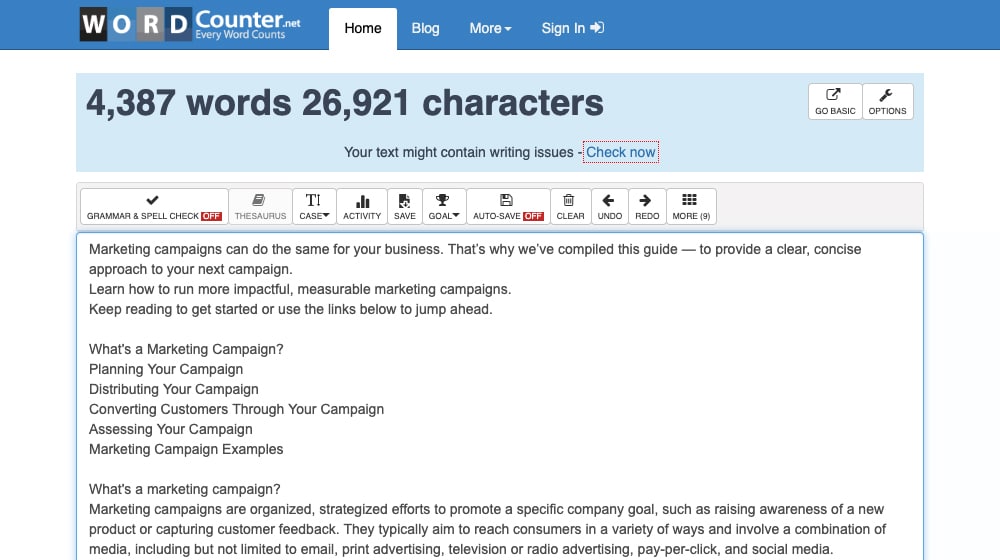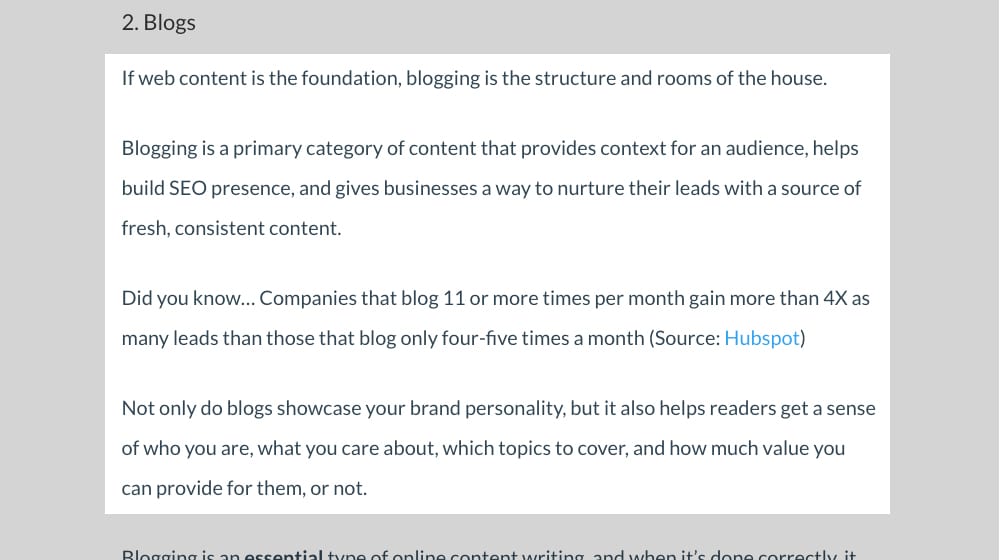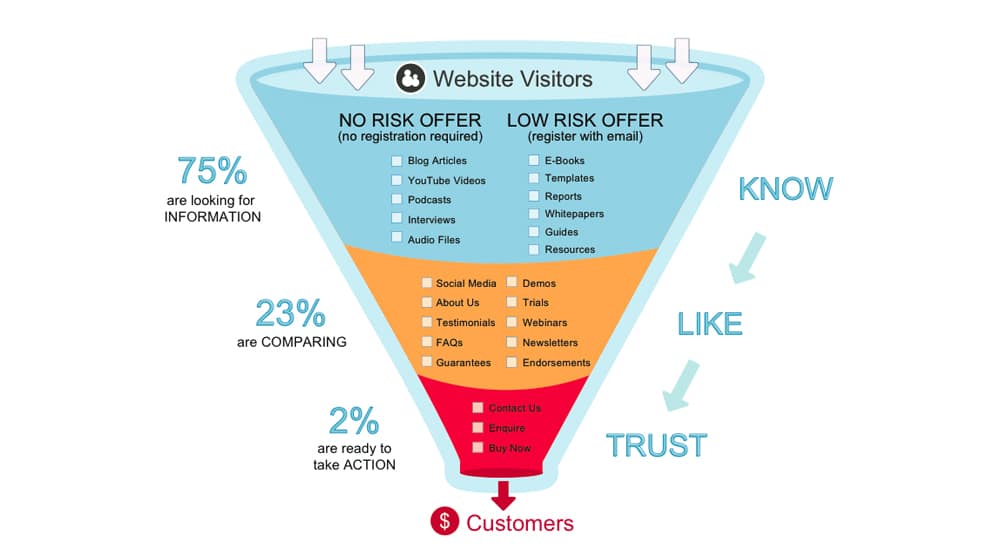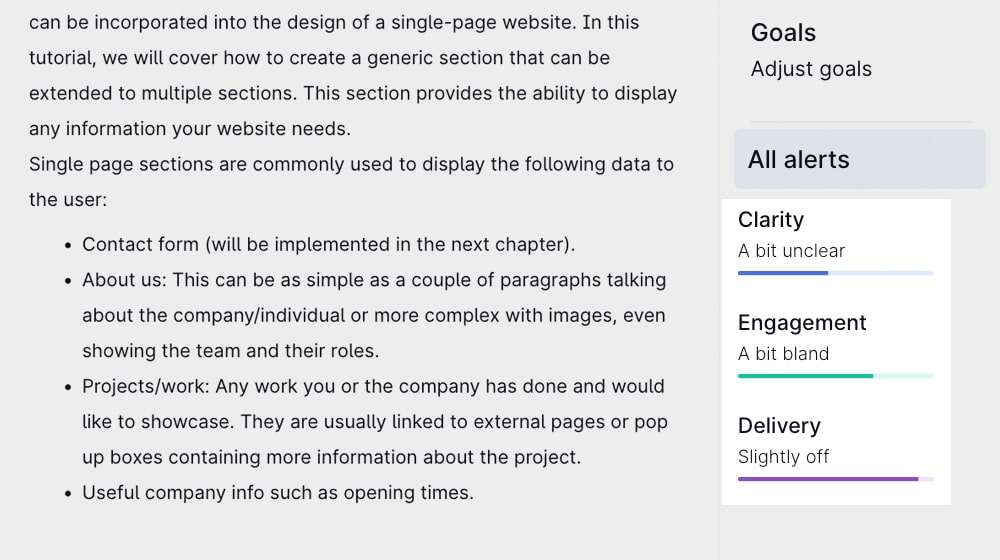What is Generic Content Writing and Is It Bad for Your Blog?

If you've spent any time researching content writing in the last few years, you've probably seen the term "generic content" thrown around. It's something to avoid, something talked about with derision, and something worth firing a content writer over.
In this post, we'll discuss what generic content is, how it can affect you, and how to spot it.
Let's get started!
 30 Second Summary
30 Second Summary
You want to avoid writing generic content, which is bland shallow content that offers no unique value. You'll hurt your site by wasting time on content that won't rank well or engage readers since it lacks depth and fresh perspectives. You can spot generic content when you find overly broad topics, little substance, no quotable insights and nothing setting it apart from existing content. Instead, you should write content that digs deeper, thinks ahead, challenges common beliefs or provides clear action steps your readers can take.
What is Generic Content Writing?
Generic content writing, or simply generic content, is exactly that. It's content that's too generic to be of any value to your business and your blog.
Here's a good example. Imagine if I were to publish a new post called "What Is Content Writing?" to our blog. Let's say you saw that post in the related posts box, or on our blog homepage, or Twitter. Would you click it?
Probably not, right?
I know I wouldn't.

Anyone who already knows what content writing is most likely doesn't have a reason to click that post. What could I possibly have to say about it that hasn't already been said by the likes of Backlinko, the Content Marketing Institute, or ExpressWriters? Not to mention the hundreds of other posts flooding the Google search results for the question.
Meanwhile, anyone who doesn't already know about content writing can probably infer what it is from the name – it's not a complex topic for an overview – or will find one of the posts I linked above.
What would my chances be of ranking for that topic? What do I have to say that would make my posts more valuable than the posts I linked and the others besides? Not much of anything. Even if I had a unique approach to content marketing, if I wanted to write a post about it, I wouldn't name it something so generic as "What Is Content Writing?"
There's that word again, generic. What is the dictionary definition of the word? Dictionary.com defines it as:
"of, applicable to, or referring to all the members of a genus, class, group, or kind; general."
Generic content is content that is indistinguishable from all of the rest of the content like it.
If you know anything about marketing, you know the whole point is to stand out and get noticed. Being one faceless member in a huge crowd does not help you stand out. Writing one generic blog post that has no distinguishing value does not help you stand out.
Generic content writing is content that is bland, is boring, has no unique value.
Why Generic Content is Bad for SEO
Generic content is bad for SEO because it doesn't offer anything unique. It doesn't showcase why your business/brand/website should be ranked above other, similar sites. Why should someone click on your site instead of another site writing the same kind of content? It's always down to other factors – the number of backlinks, the specificity of keywords, the depth of value.
Generic content doesn't rank because there's already too much content covering the topic. You can get it to rank, but you need to write 10x content, making your content much deeper, much broader, much better than the competition already out there. By doing so, your content is no longer generic.

That's the difference between a generic topic and generic content. You can write blog posts on generic topics all day, and as long as you produce excellent content on those topics, they can serve you well. A lot of evergreen content fits this description. Writing generic content, though – even for unique and non-generic topics – produces no results.
Think about all of the things that benefit SEO. Narrow topics. Defined keywords. Backlinks. Social shares and traffic. All of that comes because the content is interesting and unique. Generic content doesn't get any of it, leaving you with a piece of content that isn't benefitting your site at all.
Now, don't get me wrong. Generic content won't hurt your site. At least, not directly. It's wasted effort. It's filler. It won't penalize you, but neither will it benefit you. It's just empty content, and search engines recognize that too.
How Generic Content Hurts the User Experience
What makes a piece of content memorable? What makes people want to read it, want to share it, want to link to it? What makes people come back to use it as a reference?
A lot of things.
- Content that digs deep into a topic and comes up with interesting details and conclusions is worth referencing – or refuting.
- Content that takes ideas from a wide range of fields or topics and synthesizes them into one overarching conclusion can be very interesting to read and explore.
- Content that is formatted uniquely, whether it's a quiz, a self-help checklist, an infographic, or a video, can make even generic topics worth visiting and experiencing in a new light.
- Content presented with anger can make people righteously angry or defensive. Content written with humor can win people over to your site. Content written with an inverted perspective can prove a point with roundabout refutations of commonly accepted facts.
- Similar to depth, it can be worthwhile to take generally accepted information and put it to the test, to see if those old best practices are still true today.
Without any of this, what do you have? You end up with content that is dry, bland, superficial. It's too narrow to be useful or too broad to have depth. It covers nothing of note, offers no new data, presents no new hypotheses. Reading it, you would be left with a distinct feeling of emptiness. Why did you read it? You're still left with nothing of value.

Some bloggers like to argue that generic content is good as a resource for novices and newcomers. Sure, I could write an introduction to content marketing, and if a novice to internet marketing found my site instead of one of the hundreds of other existing resources, it could be educational to them. But that's the problem: nothing is setting my version apart from anyone else's. A novice could start at any of a hundred sites to read that introduction, and it doesn't affect their experience one bit.
Generic content only works in a vacuum, but we don't live in a vacuum. I've met a lot of business owners who absolutely refuse to acknowledge that competitors exist. They refuse to link to them, refuse to mention their names, and refuse to even reference their business models (if they differ).
Your refusal to acknowledge them does not make them cease to exist, however. Put yourself in the shoes of a customer. Who would you trust more: the business that offers you options, confident that they can prove themselves the best of them, or the one who presents themselves as the only option, hoping you'll have to rely on them?
The Effects of Generic Content on Engagement and Sales
Keep thinking of yourself as a customer. When you read a piece of content, do you come away impressed? Do you find new insight, learn new facts, and recognize new arguments? Good content leaves you with this feeling. Good content educates, motivates, and solves problems.
Generic content, again, is empty. It leaves you with nothing. It might educate you if you aren't already aware of the topic from other sources, but it isn't going to solve a problem and it's certainly not going to motivate you.
That's the biggest problem with generic content: it lacks purpose.
I often like to say that every blog post needs to have a purpose. A user has a goal in mind when they're using Google to search for something. It might be to educate themselves. It might be to answer a specific question. It might be to solve a specific problem. It might have a purchase intent. Regardless of the purpose, there is a purpose.
Every piece of content you write needs to align with that purpose and, more importantly, encourage the reader to take another step in your sales journey. A user has a goal; you swoop in with your content, hold their hand to accomplish that goal, and move them forward in the direction that benefits you.

This generally means a call to action, but it doesn't have to be a hard CTA. You don't need to turn every visitor into a sale; you can turn them into a fan, a follower, or an email subscriber first. Progress them along the path each time they arrive.
Generic content doesn't do that, for two reasons. The first is the most obvious; generic content simply doesn't rank. Unless you're already a huge company with a ton of power and resources – not to mention SEO presence – your generic content won't compete. That user won't even find your content, let alone use it to take a step along your journey.
The second is that, even if they do somehow find it, it's not going to be compelling. The best time to ask a user to take a step with a CTA is when they're satisfied or impressed with you. Your content builds trust in them. Generic content doesn't inspire those feelings. You can still put a CTA in it, but without that fresh good impression, it's not going to be effective.
How to Recognize Generic Content Writing
Perhaps I've now adequately expressed to you that generic content is a threat.

So how do you recognize it?
- The topic of the content is overly broad. Too much breadth, too much surface area, with too little substance. This happens a lot when companies with no authority choose to start off their content marketing efforts with beginner's guides and glossaries. They're easy to write because all of the information is already out there. They're low value because all of the information is already out there. Overly broad content doesn't have the depth to succeed.
- The content has very little substance to it. Content full of pithy statements with no real value to it is exceedingly common. A lot of small blogs often have the problem that they don't have ready sources of data. All they can do is parrot conclusions, they don't have the means to test them. Even I sometimes run into that issue. The solution is to use data from multiple tests and sources, synthesizing a deeper answer. Generic content doesn't do that.
- You can't find quotable nuggets of value in the content. Many blogs include a click to tweet plugin or a highlight to tweet option. They do this because they know their content is written in a way such that individual sentences and paragraphs are easy to quote. If you can read an entire post and can't think of a takeaway, that's generic content.
- There's nothing unique about your content compared to what already exists. Ask yourself what you bring to the table by writing it. If your answer is something like "my unique voice" or "my brand name", your content is generic. You need something tangible, of value not just to you but to your readers.
Have you ever read an article that is mostly fluff and just discusses things that you already knew? That's generic content.
What to Write Instead of Generic Content
If you fear you're producing generic content, or you want to avoid id, how can you do so? Here are my tips for content you can write instead of generic content.
- Content that goes deeper. Superficial content is among the most common forms of generic content. Try to dig deeper into a topic. Write your content, and look at the conclusions you draw, and ask why those conclusions are logical. Question your sources. Question your data. Question everything and start digging deeper, and strive to produce content with advanced insights.
- Content that goes broader. I know, up above I said that overly broad content is a sign of generic content. I'm talking about going even broader than that. Make being broad a selling point. Don't just cover an overview of a topic within your industry; examine the topic across multiple industries and synthesize how it works across them all. Draw similarities and differences. Make use of that broad foundation to build something more.
- Content that thinks ahead. Some of the most popular content from thought leaders is content that tries to predict the future. Content that postulates trends and predicts the way the winds will blow. Even if you're wrong, it can be fun to see how close you got to the truth.
- Content that plays devil's advocate. Ask a question that goes against the grain. Question common wisdom. Playing devil's advocate has two outcomes: either you discover a hidden truth and create an innovative piece of content, or you reiterate and prove the facts behind common knowledge. Both can be valuable. After all, situations change, and what might have been a logical conclusion in a different circumstance may no longer necessarily be the only solution now.
- Content that gives actionable advice. Ask yourself what a reader can take away from your content. What do they get out of it? What can they do next, beyond click through your sales funnel? How did your content improve their lives, their situations, their problems? Give your content a tangible takeaway.
Every topic has a way to make unique and interesting content. The trick is figuring out which method is the right one for the topic. Look at what your competitors are doing, and do something they aren't. If everyone else is going broad, go deep. If everyone else is proving a point, argue against it. If everyone else studying the past, look to the future.



 30 Second Summary
30 Second Summary



December 23, 2020
Very insightful. It seems like most of what is considered "generic" is the title/topic and how in-depth the article is. Bland or overly-broad topics are generic, and articles that only skim the surface are generic. When I dilute it down like that, it makes more sense to someone like me. Does that sound accurate?
December 27, 2020
Hi Myrtle! Well said.
I like telling people that users are looking for the "nuggets" in your content.
They don't want to read things that are common knowledge, they want to learn something, solve a problem, or find valuable information on a topic.
As far as topics, having an overly-broad topic is a recipe for generic content. The more granular you can get, the more specific details you can get into and it will be less generic. If you write an article titled "How to Start Marketing Your Website", there are 10,000 different ways to market your site, so it's very difficult to get past the introduction on a topic that massive.
So, you're spot on. Research competition and traffic, make sure your topic isn't overly broad (or too tightly focused), and give insights and information to your visitors that are generally useful. That's how you stand out from generic content.
April 27, 2021
Can generic articles still perform well? What should I do if I have a lot of articles like this already?
A lot of my blog articles are pretty broad, for example "Things to Do When Traveling in Switzerland".
Any advice you have is greatly appreciated - thank you.
-Ryan
April 29, 2021
Hey Ryan!
The first thing I would do is put myself in the shoes of somebody that would search for that topic on Google.
What would you type in? Maybe "things to do in Switzerland"?
Next, search for that keyword on Google. Look at the first 5-10 results.
Are the articles high-quality? How many words are they? How many images did they use? Can you do it better?
If the answer to that last question is "Yes", then you may need to simply add to your existing article.
If you have generic content that is low-value and short, it's not going to have a very good chance at ranking.
Generic content can still perform, it's just much more difficult. The more generic the topic, the higher the likelihood that much larger websites than yours have blogged about this topic a million times, and those are the sites that are going to show up - not yours.
Most of the time, though, it's simply easier and higher-value to avoid generic content altogether. If a million websites have already written about your topic, it's a lot harder to add any new insight or value that they haven't already blogged about.
May 24, 2021
Great post, thank you
May 26, 2021
Thanks Donald!
June 15, 2021
I have a couple of articles that are generic but can be combined to create a more narrow article. Do you suggest doing that?
June 17, 2021
Hey David!
It depends. Sometimes this ends up sounding mashed up and doesn't work as well as you'd like.
Sometimes redirecting them to a new post that you start from scratch is easier and more effective.
If the content is legitimately good, you can still save some snippets from the old posts.
I've done this a couple of times, and it's always been a pain. Rewriting it completely and redirecting the old ones is usually a better approach.